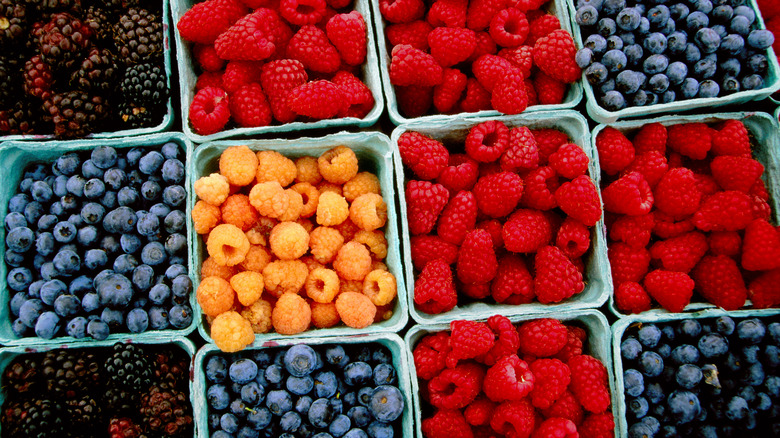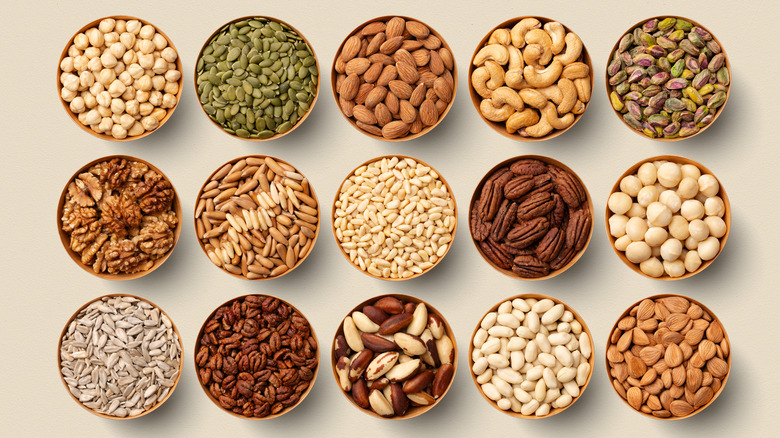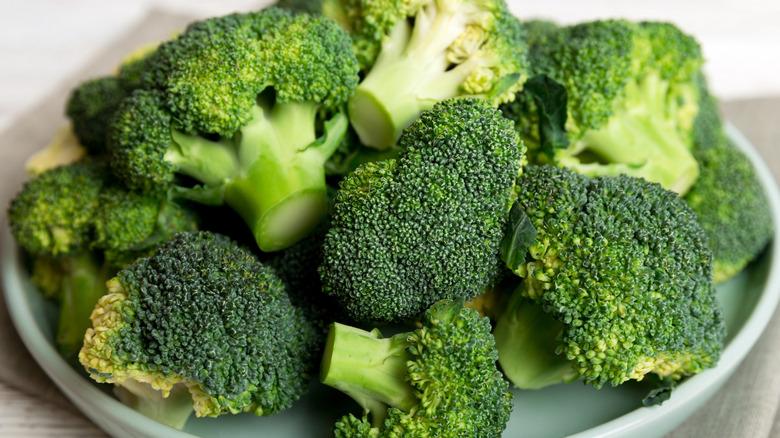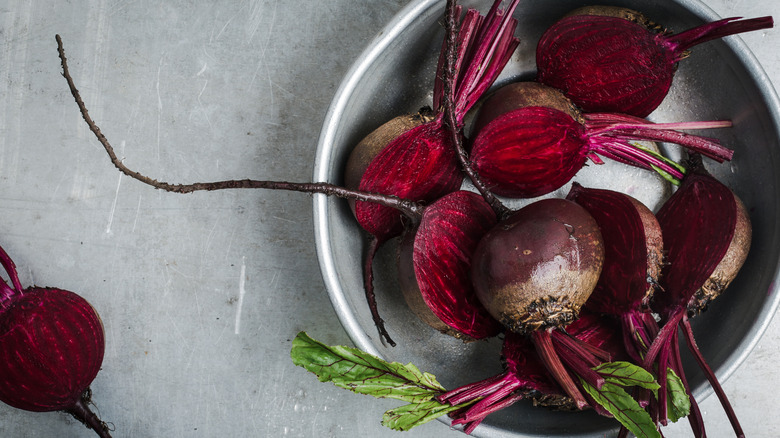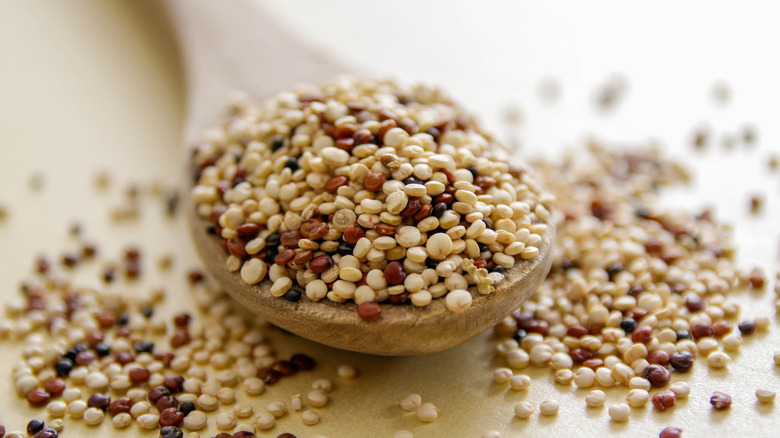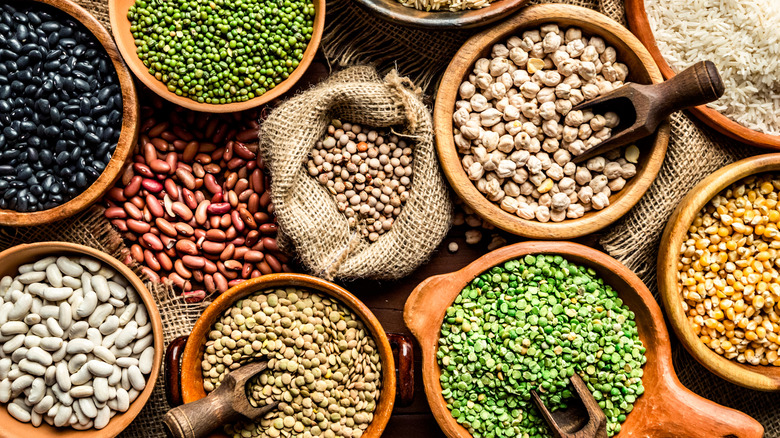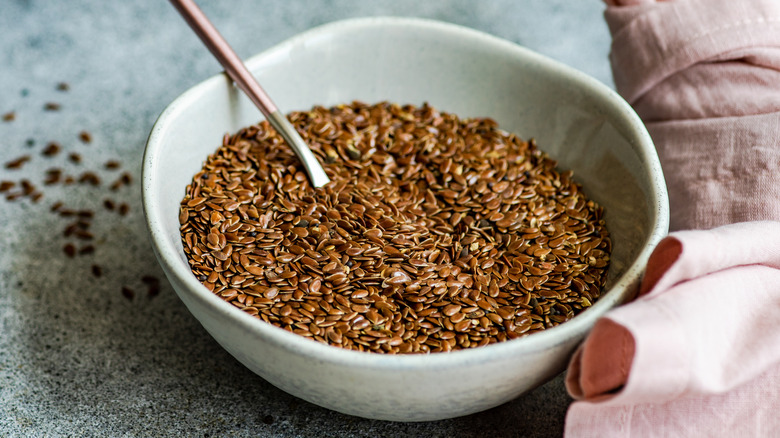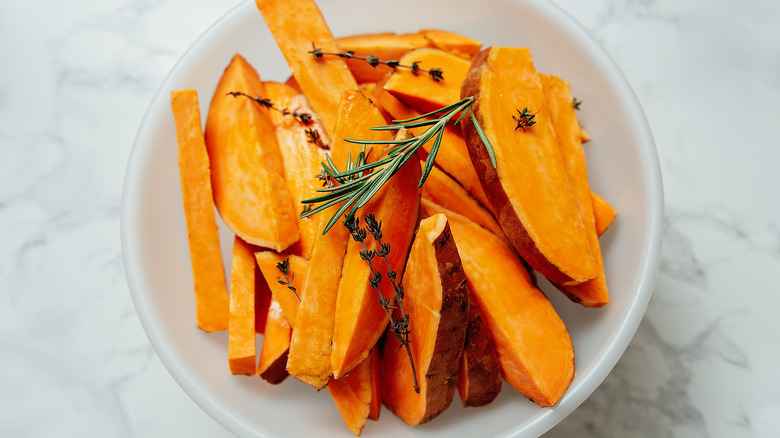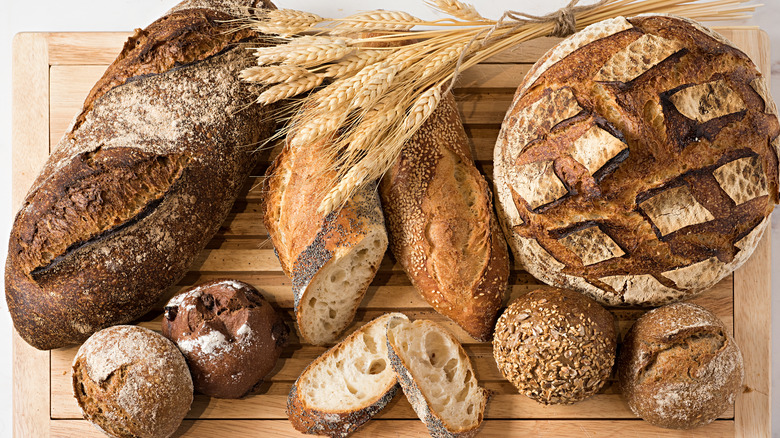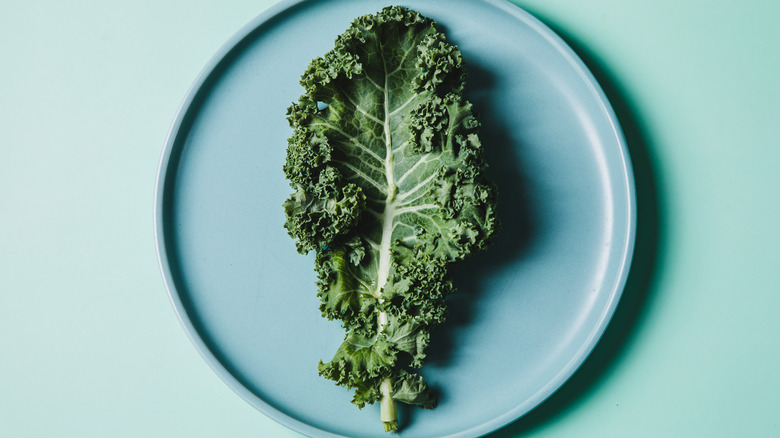14 Healthy Foods You Can't Eat If You're Following The Carnivore Diet
In today's diet-centered world, there seems to be an unspoken arrangement between dieters stating that the best or fastest way to achieve your health goals is to eliminate entire food groups from your menu. For example, the keto diet promises weight loss and blood sugar control by focusing on consuming animal-based proteins and fatty foods while limiting your carb intake to what some veggies and small portions of berries provide. Similarly, the vegan diet promises cancer prevention and improved heart health by eliminating all animal-based foods and their by-products (via WebMD). Finally, you can find the carnivore diet on the opposite end of the spectrum.
The carnivore diet can be described as a more strict type of keto diet, seeing that while both avoid carb-rich foods like legumes, grains, and most fruits, the former also eliminates veggies and fatty foods like nuts, seeds, and oils. Instead, it involves consuming only animal-based products, such as meat, fish, eggs, seafood, and a limited amount of dairy (via Harvard Health Publishing). While this is a relatively new dietary pattern, proponents of the carnivore diet claim it promotes weight loss and improved metabolic markers. Nevertheless, it comes with significant limitations, seeing that plant-based foods provide vital nutrients like vitamins, minerals, fiber, and bioactive compounds essential for overall health (per Healthline). This article takes a closer look at some of the healthiest foods you can't eat when following the carnivore diet.
Berries
Berries are a group of various fruits in different shapes, flavors, colors, and sizes, including blueberries, cranberries, blackberries, raspberries, strawberries, and goji berries. Besides being refreshingly tasty, they are incredibly nutrient-dense, which grants them multiple health-promoting properties. While they are all independent fruits, they're often grouped due to their shared health effects, starting with those provided by their high antioxidant content. According to a review in the Annual Review of Food Science and Technology, compounds such as polyphenols and vitamin C have linked these fruits to a lower risk of developing some cancers, heart disease, stroke, and even longer lifespan. Moreover, their antioxidant profile mixed with their fiber content means that they're good at keeping your blood sugar, body weight, and gut health in check.
Additionally, an article in Nutrients shares that some berries might help lower your blood pressure and cholesterol levels. According to Healthline, the blood pressure-lowering effect might be due to their antioxidant content, which helps fight inflammation-induced damage to the walls of the arteries, whereas the review attributes their cholesterol-reducing effects to the fruits' fiber content. Nevertheless, given that a one-cup serving of berries provides 15 grams of carbs (per the USDA Food Database), they're banned from the carnivore diet's menu.
Nuts
Whether you prefer almonds, walnuts, cashews, pistachios, hazelnuts, or pecans, nuts are nutritional powerhouses that make for healthy and convenient snacks, as well as versatile, nutrient-boosting additions to countless recipes thanks to their multiple health benefits, which, per a review in Nutrients, have everything to do with their healthy fat, fiber, antioxidant, and plant-based protein content. For example, another review in the International Journal of Environmental Research and Public Health states that the cumulative effect of the said beneficial compounds in nuts might help reduce the risk of age-related diseases like cancer, heart disease, diabetes, sarcopenia, and mental conditions.
For starters, nuts are known for being rich in monounsaturated and polyunsaturated fats, which help reduce total and LDL (bad) cholesterol levels, effectively reducing the risk of heart conditions (via Healthline). Moreover, despite being calorie-dense foods, the initial review shares that they might help with weight control due to their protein and fiber content, which promote feelings of fullness, reducing overall calorie intake. Lastly, antioxidants in nuts, like vitamin E and polyphenols, help combat oxidative stress and reduce inflammation, contributing to lower risks of chronic diseases (per Healthline). Yet, despite providing a minimal amount of carbs per serving, nuts are still a no-go in the carnivore diet, along with all other forms of plant-based foods (per Healthline).
Olive oil
Rich in healthy fats and antioxidants, this golden liquid can be described as the backbone of the Mediterranean diet, one of the healthiest eating patterns recommended by experts around the globe (per the Mayo Clinic). Yet, the carnivore diet insists on removing it from your menu. Starting with its ability to support heart health, olive oil has proved to be an ally in lowering blood pressure, an effect that an article in Nutrients attributes to the oil's antioxidant polyphenols and monounsaturated fatty acid content, namely oleic acid. The antioxidants in the oil further enhance overall health by reducing inflammation, which is the culprit of numerous chronic conditions, including Alzheimer's disease, cancer, obesity, and arthritis (via Healthline).
Furthermore, a review also published in Nutrients links olive oil to numerous beneficial effects on different aspects of women's health, such as improving markers of postmenopausal disorders, helping with painful periods by reducing pain intensity and duration, and increasing bone mineral density to protect postmenopausal women from osteoporosis. In addition, olive oil might also support cognitive function and improve metabolic health by promoting weight loss and reducing the risk of type 2 diabetes (per Healthline).
Broccoli
Like other cruciferous vegetables, broccoli is celebrated among health professionals and enthusiasts for its numerous health benefits derived from its vitamins, minerals, fiber, and powerful antioxidant compounds. One of broccoli's most notable beneficial effects is its cancer-fighting properties, which are highly attributed to its sulforaphane content, which has been studied for its ability to inhibit cancer development (via Healthline). In fact, regular broccoli intake has been associated with a lower risk of certain cancers, including lung, breast, and prostate cancers.
This vegetable is also a powerhouse of vitamins and minerals, which, per a review in Antibiotics, help prevent numerous conditions. For example, its vitamin A content supports eye health by preventing age-related macular degeneration and cataracts. In contrast, calcium and vitamin K promote bone health by preventing osteoporosis, while vitamin C boosts the immune system. Last but not least, being a rich source of fiber, broccoli promotes digestive health by supporting the healthy bacteria in your gut, as well as preventing constipation and lowering the risk of type 2 diabetes, per Medical News Today (MNT). Still, you won't find a trace of broccoli for miles when following a carnivore diet.
Yogurt
As long as you choose one without added sugars, yogurt can be a healthy addition to any diet except for the carnivore diet, in which only those who choose to slightly bend the rules and ignore its carb content in favor of its health benefits consume it in small amounts (via Healthline). Made by fermenting milk with beneficial bacteria, yogurt is a source of high-quality protein, micronutrients, and probiotics that support overall health. For example, a review in Nutrition Reviews explains that when probiotics in yogurt reach your gut, they might help your microbiota protect you against harmful microorganisms, boost your immune system, and support your digestion. Plus, the review determined that yogurt intake might also reduce the risk of type 2 diabetes and some cancers, such as breast and colorectal cancers.
In addition, as an excellent source of calcium, yogurt helps maintain strong bones and teeth (via MNT). Furthermore, according to another review in the Journal of Dairy Science, yogurt might be a suitable choice for people who cannot tolerate lactose due to its probiotic and low-lactose content. Lastly, it states that yogurt may promote heart health by helping lower blood cholesterol levels.
Beets
Beets, or beetroot, have an earthy flavor, a bright pink to purple color, and a ton of nutrients that boost their beneficial health effects. Starting with one of their most popular benefits, beets are known for their impact on exercise performance, which is attributed to their nitrate content. This happens because nitrates enhance oxygen efficiency during training, ultimately improving endurance and stamina (via Healthline). On that same note, the site explains that nitrates in beets also have the ability to improve heart health by lowering blood pressure, which they achieve by reducing the strain on your blood vessels, helping them dilate to facilitate blood flow.
Moreover, per a review in Nutrients, beets have a remarkably high antioxidant content, namely betalains, which protect your DNA and cells from oxidative stress damage and inflammation, making them allies for reducing the risk of chronic conditions, including cancer, arthritis, type 2 diabetes, and degenerative brain disorders like dementia and Alzheimer's disease. Lastly, beet's relatively high fiber content supports digestive health and blood sugar control, which is backed up by their low glycemic load, meaning that they don't spike your blood sugar levels after consumption (per Healthline).
Quinoa
Despite being popularly regarded as a superfood due to its high nutritional value, quinoa is another food you won't find in the carnivore diet. Regarding its health benefits, quinoa has a lot to offer. Starting with its protein content, an article in Antioxidants explains that, unlike most plant-based foods, quinoa provides all essential amino acids, making it a complete protein source. This means that its protein profile is similar to animal-based sources, which is why this pseudograin has become a staple for those following vegan and vegetarian diets. Additionally, since it is naturally gluten-free, it is a safe and nutritious option for people with celiac disease or gluten sensitivity.
What's more, per a review also published in Antioxidants, quinoa has an exceptional fiber content that is higher than that of other cereal grains. Thus, it promotes digestion and helps maintain a healthy gut environment. Additionally, its fiber content also helps lower your chances of developing diabetes and colon cancer and keep your body weight under control (via the Cleveland Clinic). Finally, quinoa's high antioxidant content (which is higher in darker varieties) helps fight oxidative stress and reduce inflammation, potentially lowering the risk of chronic diseases.
Legumes
Legumes, also known as pulses, are a group of foods, including lentils, beans, chickpeas, soybeans, peas, and peanuts. They are praised for their nutritional profile, seeing that, per a study published in Advances in Nutrition, they're packed with plant-based protein, fiber, vitamins, minerals, and antioxidants, making them a cornerstone of healthy diets worldwide — with the exception of the carnivore diet. For example, per the study, legume intake has been associated with a reduced risk of heart disease and type 2 diabetes. On the one hand, legumes are believed to protect heart health because they help lower blood cholesterol levels and provide very little fat and sodium, improving heart health markers (via The Nutrition Source).
On the other hand, the site mentions that their anti-diabetic effects derive from their high fiber and resistant starch content, which, paired with their low glycemic index, helps control your blood sugar levels. Moreover, fiber and resistant starch in legumes also support bowel function and keep you feeling full for longer, promoting digestive health and weight loss, respectively. In addition, according to a review in the Journal of Preventive Medicine and Hygiene, legumes have more proteins than cereals, so they have become a particularly valuable protein source for vegans, vegetarians, and anyone trying to reduce their animal protein intake.
Flaxseed
Small but mighty, flaxseed is a tiny seed packed with nutrients that offers numerous benefits for overall health and wellness. According to a review in Nutrients, the main health-promoting components in flaxseed are omega-3 fatty acids (namely alpha-linolenic acid (ALA)), fiber, and lignans, which are responsible for the seed's potential to reduce the risk of cancer, heart disease, brain disorders, and menopausal symptoms, as well as helping with diabetes control and improved gut health. Yet, despite all these beneficial effects, the carnivore diet insists on avoiding it.
Per Healthline, test-tube and animal studies on flaxseed's anti-cancer effects show that it helps stop cancer growth and may protect against colon, lung, skin, breast, and prostate cancers. In contrast, its heart health benefits derive from its potential to lower blood pressure, blood cholesterol levels (especially LDL (bad) cholesterol), and reduce arterial inflammation. Regarding its anti-diabetic properties, flaxseed might help manage blood sugar levels, while its digestive support comes from preventing both diarrhea and constipation. In addition, a review in Healthcare mentions that flaxseed might reduce depression symptoms, lower the intensity and frequency of menopausal hot flashes, and improve skin health by improving hydration, smoothness, and wound healing.
Coffee and tea
Whether due to their warm and cozy flavor or their vastly studied health benefits, coffee and tea are two of the most popular and widely consumed beverages worldwide after water. Yet, the carnivore diet only allows for the latter, setting both drinks aside with other understandably less healthy options, like alcohol and soft drinks, and ignoring their numerous health benefits (via All Things Carnivore). For example, while each provides its own antioxidant varieties, both coffee and tea are loaded with them, helping reduce your risk of cancer and heart disease. Similarly, despite providing varying amounts, the two are also good sources of caffeine, a stimulant known to improve mood, boost alertness, and reduce the risk of chronic conditions like type 2 diabetes and metabolic syndrome (via Healthline).
When taking a closer look at them individually, evidence suggests that coffee may promote weight loss in a dose-dependent manner, meaning that the higher the intake, the higher the weight reduction, an effect that likely occurs due to its higher caffeine content (per MNT). On the other hand, a study in the Asia Pacific Journal of Clinical Nutrition shares that, due to its L-theanine content, tea has a mind-relaxing effect that helps you keep your focus without feeling drowsy.
Sweet potatoes
Available in orange, red, purple, and yellow varieties, sweet potatoes are tubers packed with antioxidants and fiber, making them a wholesome addition to balanced diets. Starting with their antioxidant content, a review in Foods lists sweet potatoes as excellent sources of beta carotene, a powerful antioxidant that the body converts into vitamin A, explaining that orange-colored ones have the highest amount among the different varieties. In fact, one medium-sized sweet potato provides 122% of vitamin A's recommended daily intake (via the USDA Food Database). Vitamin A is a fat-soluble vitamin essential for eye health, immunity, and tissue growth (per the National Institutes of Health (NIH)). Moreover, the review adds that sweet potatoes also provide antimicrobial, anti-obesity, anti-inflammatory, and cancer-fighting properties.
What's more, being rich in fiber, sweet potatoes also have anti-diabetic effects, as fiber helps manage blood sugar levels and improve how your cells react to insulin (via Healthline). Nevertheless, evidence also suggests that sweet potatoes might actually spike your blood sugar due to their high glycemic index and load (via The Nutrition Source). Finally, sweet potatoes are also very good sources of vitamins and minerals, such as vitamins C and E, which also provide antioxidant properties; potassium, which promotes heart health; and manganese, which helps support a healthy metabolism (per Healthline).
Whole grains
Whole grains or cereals include brown rice, whole wheat, oatmeal, sorghum, and millet. The difference between whole and refined grains centers on their processing, as refined grains go through a process that removes their bran and germ, meaning that they end up consisting of endosperm only. In contrast, as their name suggests, whole grains remain whole, and by keeping all three parts, they become a better source of vitamins, minerals, fiber, and antioxidants (via Healthline). In fact, one of their most significant benefits is their high fiber content, which, per a review in Nutrients, consists of a healthy balance of soluble and insoluble fiber, granting whole grains with heart-healthy, anti-obesity, and anti-diabetic properties.
Additionally, according to a review in Frontiers in Nutrition, while their content may vary depending on the cereal, whole grains provide almost all B vitamins, which play countless roles in your body, including energy production, oxygen transport, and red blood cell formation (per The Nutrition Source). Yet, being a type of keto diet, the carnivore diet doesn't include whole grains.
Grapefruit
While all fruits have their mix of beneficial compounds and health-promoting effects, grapefruit has been a popular ingredient in multiple diet plans (except for the carnivore diet) because while it packs a punch of nutrients, it cuts down on calories, making it a weight-loss-friendly food (via Healthline). Yet, its benefits account for more than its low calorie count. For starters, it is exceptionally rich in vitamin C and provides a good amount of vitamin A per serving. In fact, according to Johns Hopkins Medicine, eating a whole grapefruit will cover your daily vitamin C needs and half of vitamin A, benefiting your immune system and eye health, respectively.
Moreover, its fiber content adds to its anti-obesity effects by helping curve your appetite. This is because it promotes feelings of fullness, which, in turn, helps reduce your overall calorie intake. Plus, grapefruit's fiber content also boosts your digestive and heart health.
Kale
Kale is a leafy green popularly regarded as a superfood due to its high nutritional density, meaning that a small serving provides a large amount of nutrients. One of its most remarkable traits is its high vitamin K content, a fat-soluble vitamin essential for blood clotting and bone strength (via the NIH). In fact, per the site, a one-cup serving of raw kale covers 94% of its recommended daily intake. Furthermore, since kale belongs to the cruciferous vegetable family, it contains compounds like sulforaphane and indole-3-carbinol, which have been studied for their potential cancer-fighting properties (via Healthline).
In addition, the site mentions that kale contains a wide range of antioxidants, such as quercetin, kaempferol, beta-carotene, lutein, and zeaxanthin. While evidence on the first two links them to reduced oxidative stress and inflammation, two key elements in the fight against chronic diseases, the latter are known for promoting eye health. Lastly, it is also a good source of fiber, which helps manage blood sugar, improves gut motility, and promotes heart health (per MNT).


